|
Assyrians and Kurds in northern Iraq
The mountains are our only friends. This Kurdish saying does not hold at all for the Assyrian Christians in the mountainous area of northern Iraq at the border with Turkey. In this region the current Kurdish rulers above all take care of themselves. August Thiry, photographer Geert Segers and their guide Melkan Ishak found out that the last Assyrians are still a long way from home in their own homeland. Read the report of this secret visit to the high north of Iraq in the late spring of 2004. August Thiry - Photography : Geert Segers
Dairabun Crap
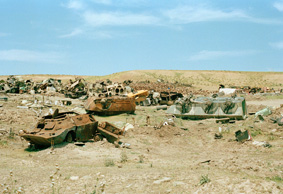 Scrapheaps of Saddam's army
It appears to be wishful thinking. At Dairabun, the last village before we go downhill to the river, we are stopped by Kurdish militiamen. Ashur, our Assyrian driver shows the document with our names on it. A permit that identifies the persons in the car as guests of the Assyrian Democratic Movement ADM, the most important Christian political party in the new post-Saddam Iraq. The Kurdish guards are not impressed. The order is loud and clear: Hand over the official passports or get lost immediately! Ashur argues in vain, turns the car and drives back, while mumbling between his teeth and swearing the militiamen to hell. And their mothers to the whorehouse.
Close to the Iraqi border town Zakho we pass an immense row of trucks. The drivers are sitting down on the roadside and are preparing their food on improvised fires. It may take days before they can cross the border. The trucks are overloaded like mules with the debris of the army material from the scrapheaps on the Tigris. Adventurous Kurdish businessmen have bought it and are eager to get their stuff over the border for further processing. A clever way, so it seems, to make some profit out of the last remnants of the old Iraqi regime. At least for those who have the right – Kurdish – connections.
A Christian Enclave
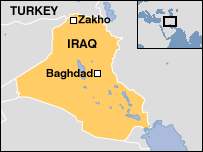 After the Gulf war of 1991 a semi-autonomous Free Kurdistan was de facto established in northern Iraq. The distribution of seats in the Kurdish parliament at Arbil, the capital of this so-called Free Kurdistan, hasn’t substantially changed for more than ten years. Massud Barzani’s Kurdish Democratic Party KDP got fifty seats and its rival, Jalal Talabani’s Patriotic Union of Kurdistan PUK obtained the same number. The five remaining seats were allocated to the Christian minority in northern Iraq. After the Gulf war of 1991 a semi-autonomous Free Kurdistan was de facto established in northern Iraq. The distribution of seats in the Kurdish parliament at Arbil, the capital of this so-called Free Kurdistan, hasn’t substantially changed for more than ten years. Massud Barzani’s Kurdish Democratic Party KDP got fifty seats and its rival, Jalal Talabani’s Patriotic Union of Kurdistan PUK obtained the same number. The five remaining seats were allocated to the Christian minority in northern Iraq.
These Christians, of Semitic stock, speak their own idiom, Sureth or Assyrian, which is derived from the old Aramaic language. They are divided by different religious traditions and they belong to at least three Churches: Syrian-Orthodox Church, Assyrian Church of the East and Catholic Chaldean Church. The total number of Iraqi Christians today is roughly estimated between 600.000 and one million. They are living in Basra and Baghdad and there are concentrations of them in the northern province around the town of Mosul. In its attempts to arabize this Christian minority Saddams Baath regime erased in 1977 the ethnic denomination Assyrian from the lists of the national census. Chaldean Christians were a bit better off and even had friends in high places: former Baath- topman Tariq Aziz was himself a Chaldean.
After the fall of Saddam a conference of all Aramaic-speaking Christians of Iraq in October 2003 made an appeal for unity under the common name Chaldo-Assyrians. They demanded education in their Aramaic idiom and administrative self-government in the so-called Assyrian triangle, a minor area to the east and the north of Mosul. But even in that enclave they are just a bare majority – a kind of Christian reservation, so to speak, in the vicinity of the ruins of Niniveh, the capital of the ancient Assyrian Empire long before Christ. And farther north, towards the Turkish border, they seem even more isolated and pushed aside by their mighty neighbours and fellow citizens, the Kurds.
Twenty Signatures
In the ADM-office in the centre of Zakho nobody is pleased with the state of affairs. Our driver Ashur explains what happened at Dairabun and doesn’t fail to stress the arrogance of the Kurdish militia. The ADM-officials are smoking and listening to his story, and in between they give comment, grumbling in the guttural sounds of their Sureth idiom.
Andrayuz is a sturdy man of forty with thick black hair and a trimmed moustache. He is the main delegate of the local Assyrians at Zakho and his theatrical body language is quite revealing, so that the gradual translation of his words just repeats what has already been visualized.
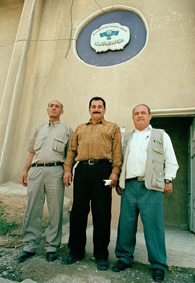 Zakho - ADM spokesmen
Is it really that bad? At first sight life seems quite normal in Iraqi Kurdistan. Mister Andrayuz throws up his arms, as if calling the Almighty from His heavenly throne. ‘Kurdistan? You mean the Stolen Land for sure!’ He is actually born in the village where we had that incident with the Kurdish militia. ‘Dairabun was once an entirely Christian village, but gradually we became a minority there. Just now Yezidi’s – members of an ancient Kurdish sect, which we call Satanists, Devil-Worshippers – turned up in that area. The Kurdish government has promised to build houses for them while all the scrap from Saddam’s army material is dumped on our grounds. Dozens of Christian families from Dairabun, who had left the village under Saddam and were up till now living in Baghdad, want to return to their homes. But they are flatly denied access to their own village. Some time ago I went once again to Dairabun to claim our rights as legitimate owners. I pleaded and shouted that they could take hold of me or hang me on the spot, but that I demanded a just solution. All in vain, the KDP-militiamen just laughed in my face. Recently our Kurdish rulers have come up with something new. They want to give back twenty houses to the Christians of Dairabun. But that is just peanuts. How am I going to select those who can return home from Baghdad?’
Andrayuz shows me a piece of paper. It contains a list of names and twenty signatures. Twenty Assyrian families from Zakho have signed the list, thus stating that they want to settle down in Dairabun. ‘A make-shift solution,’ says Andrayuz. ‘Our only way to keep an eye on the village. What else can we do? We have no money, no power. Everything goes to the Kurds. They are popular in Europe, they are the good friends of our American liberators. We, Christians, are dumped like scrap. Does that look like real democracy? Under Saddam we had to be silent, but when you kept your head down, you were safe and nobody would touch your property. The bad guy is gone now, but what do we see when we look around: no rights for the Assyrian minority and Kurdish rule everywhere. So, where is the change for the better?’
Madam Berwari
ADM-man Yonan is a balding small guy, chubby all over and wearing a sleeveless white shirt under a wrinkled cotton waistcoat. We follow his red pickup on our way to the mountains east of Zakho, along the border with Turkey. The ride offers magnificent views. An alpine touch, Little Switzerland in humid blue morning light. We cross the river Khabur and continue our journey through the broad valley of Berwara Bala, where Kurds and Assyrians have been living apart together for ages. That rural pattern of mutual understanding, superficial and fragile as it may have been, is now completely broken due to recent changes. ‘Take a deep breath and clean your lungs,’ says Yonan. ‘Berwari is a real paradise to us, but they do everything they can to throw us out of it.’
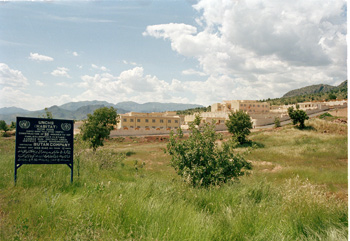 Berwari UN Habitat project
UN-Habitat, the United Nations Human Settlements Programme, promotes and finances the housing of refugees who want to relocate in their original homeland. Which refugees were so lucky in this case? ‘All this is for Madam Berwari’s Kurdish clan,’ explains Yonan. ‘She is very resourceful, she actually is the source herself and she divides all the water, or the money, among her own people. Thanks to UN-Habitat two hundred Kurdish families are installed here. What you see is only a part of the project. Three more housing estates, just as big as this one, are planned in the neighbourhood.’
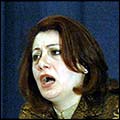 Nasreen Berwari
The process of expropriation has been going on for some years now. In October 2002 the Kurdish parliament at Arbil passed a resolution which was called General Conditions for the Ownership of Legally Obtained Land. The resolution applied to all the land occupied till the start of the year 2000 and Kurdish squatters, who had settled down on territory deserted years ago by Assyrian Christians, could legally obtain the land at officially fixed basic prices. So, the greater part of this land went to the Behdanani-Kurds, the tribal community around Barzani’s KDP.
Small Game
Yonan’s red pickup sways through the sharp bends of a gravel path towards the summit of a hill. We are welcomed by the guardian of an Assyrian primary school without pupils.
Yonan explains what happened to the Christians of Jakalah. ‘Under Saddam many of them fled to the south, to the bigger towns where life was supposed to be safer. Their old houses, made of mud and stones, crumbled away and finally came down. This school here is the only building we were able to rebuild so far. With our own money, without any financial support from the Kurdish government. Under such conditions it is quite understandable that the major part of the Jakalah Christians has not returned home yet. You see, under the Baath-regime Saddam and his topmen came hunting big game in these mountains. And now, now we have become small game for our Kurdish neighbours.’
Even to an exceptionally beautiful, but also remote mountainous region like Berwari one does not return without any guarantee of safety or minimum comfort. The few Assyrians who did so anyway are allowed to cultivate some land, about fifty hectares. They have irrigated the land at their own expenses and they grow apples on it. For the time being however, their children are not expected to show up in the primary school. The most spacious classroom is still packed with chopped straw. The guardian of the school explains what happened: the sun of the Kurdish farmer who uses the classroom as his stable and storage space is a KDP-activist and he knows Barzani very well.
Voting with their Feet
There are still a few stone and mud houses with low flat roofs in the Christian hamlet of Low Jakalah or Chelke as the place is also called. The eight centuries old Mar Moshe church is situated nearby on a high rock. The church has recently been restored with funds raised by Assyrian emigrants from Berwari. The rectangular church building with its thick walls and small window holes looks like a religious fortress from ancient times, recalling the great days of the Assyrian-Nestorian Church of the East. And its gloomy interior just as well preserves the traditions of unspoilt oriental Chrstianity. There are no statues of saints, no paintings, no decorations at all. Only bare white walls, and an inscription in Old Aramaic or Syriac above the doorway to the sanctuary.
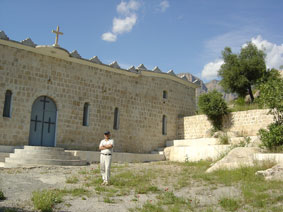 Berwari - Mar Moshe
I say amen to that. It is not a matter of spectacular violence like elsewhere in this so-called liberated, but in fact ruined country between Tigris and Euphrates, and yet, the future doesn’t look bright for the last Assyrian Christians in Kurdish northern Iraq.
Till the general free elections of December 2005 the provisional government remains in power in Iraq. In this government there is one Assyrian minister, Pascale Ishoo Warda, a Christian woman from northern Iraq. It must have been a cynical joke: she got the post of Minister for Migration.
So, it is not surprising that instead of returning to their homeland, Assyrian Christians are on the contrary much closer to a new exodus from Iraq. ‘Minister of Migration!’ says Yonan. ‘We have understood the hint quite well. Mind my words: many of us will vote their own way, with their feet!’ And what will happen to the Assyrians who want to stay in spite of everything? They can do so. Provided they can live with the statement KDP-leader Barzani once allowed himself: Assyrians? All Kurds who became Christians!
It is said that the real democratic value of a state can be determined by the way it treats its own minorities. The Kurds in Turkey, for instance. Or the Iraqi Kurds under Saddam. If this is true, the democratic qualities of a minority struggling for cultural, political and even national autonomy, can also be judged by the way it treats the even smaller ethnic communities on its territory. In other words: Free Kurdistan in northern Iraq still has a long way to go to fulfil the pledge of its title. Just ask the Assyrians in that border region.
|

 Homeland
Homeland  Iraq
Iraq  Berwari
Berwari

 Homeland
Homeland  Iraq
Iraq  Berwari
Berwari